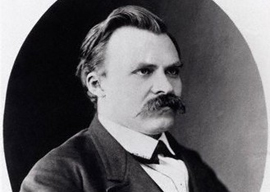
September 05, 2011

F. Nietzsche
The news abounds with references to “rights,” “diversity,” and “justice.” But what do these terms signify? Allegations of Libyan “rights” abuses were powerful enough to justify a more widespread and large-scale Western version of what Gaddafi did—namely, demolishing an existing government and then oppressing and killing a lot of people.
In more local news, one of my alma maters has received over $19,000 for a “diversity initiative” program. It’s unclear what a diversity initiative program is, because university spokespeople have explained it in vague terms about “providing ongoing assistance and guidance to newly admitted international students,” “supporting travel,” “developing leadership and community service,” “promoting team building and unity,” and “assisting in breaking down barriers in communication.” In short, a diversity initiative is so vague that it can mean anything—hence nothing—at all.
“Justice” is another matter. Families of 9/11 victims recently told reporters that justice has not been served because no one has produced a public timetable for trying suspects at Guantanamo Bay. Family members lamented everything from “the years I’ve got left” to see justice done, to looking “pretty weak” for not bringing “these people” to trial, to sending a “terrible message” to people of the “free world” and to “those who are out to harm us.” Still, these cries don’t do much to clarify what is meant by “justice.”
If we can’t settle on the above terms’ meanings, perhaps we can glean insights about their purpose—that is, why people employ them and their intended effects.
In his recent article about politically correct orthodoxy on university campuses, Professor Paul Gottfried recalled accusing a colleague of embodying what Nietzsche called “slave morality.” Nietzsche’s slave morality is tied to Christianity, Platonism, and Enlightenment idealism: philosophies that celebrate weakness and mildness as virtues, champion mankind’s unremitting progression, and emphasize self-negation at the expense of self-actualization. Slave morality is, in short, sickly.
Aristocratic morality, by contrast, is virile and noble—so much that envious slaves seek to undercut it. Nietzsche used the French word ressentiment to refer to slaves’ contempt for the aristocracy. Slaves convince aristocrats that it is virtuous to deny the self and to pity others. Slaves use pathos to bring about a revolt in morals: the outright reversal of good and bad, valued and devalued. As a result, aristocrats actively seek to minimize their power through self-sacrifice and compassion: bad things that slaves recast as good. Eventually, with the help of the priestly caste—made up of those who belong among aristocrats but force aristocrats to internalize guilt and shame—slaves succeed in redefining morality as immorality. Aristocrats exhaust their power by suppressing it in the pursuit of what they think is goodness. At length, aristocrats become indistinguishable from slaves, and selflessness becomes the dominant criterion for determining what’s good.